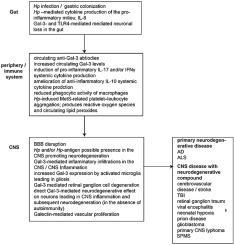Neurochemistry international ( IF 4.4 ) Pub Date : 2017-12-13 , DOI: 10.1016/j.neuint.2017.12.003 Marina Boziki , Stergios A. Polyzos , Georgia Deretzi , Evangelos Kazakos , Panagiotis Katsinelos , Michael Doulberis , Georgios Kotronis , Evaggelia Giartza-Taxidou , Leonidas Laskaridis , Dimitri Tzivras , Elisabeth Vardaka , Constantinos Kountouras , Nikolaos Grigoriadis , Robert Thomann , Jannis Kountouras

|
Neurodegeneration represents a component of the central nervous system (CNS) diseases pathogenesis, either as a disability primary source in the frame of prototype neurodegenerative disorders, or as a secondary effect, following inflammation, hypoxia or neurotoxicity. Galectins are members of the lectin superfamily, a group of endogenous glycan-binding proteins, able to interact with glycosylated receptors expressed by several immune cell types. Glycan-lectin interactions play critical roles in the living systems by involving and mediating a variety of biologically important normal and pathological processes, including cell-cell signaling shaping cell communication, proliferation and migration, immune responses and fertilization, host-pathogen interactions and diseases such as neurodegenerative disorders and tumors. This review focuses in the role of Galectin-3 in shaping responses of the immune system against microbial agents, and concretely, Helicobacter pylori (Hp), thereby potentiating effect of the microbe in areas distant from the ordinary site of colonization, like the CNS. We hereby postulate that gastrointestinal Hp alterations in terms of immune cell functional phenotype, cytokine and chemokine secretion, may trigger systemic responses, thereby conferring implications for remote processes susceptible in immunity disequilibrium, namely, the CNS inflammation and/or neurodegeneration.
中文翻译:

幽门螺杆菌相关的galectin-3对神经变性的潜在影响
神经退行性代表中枢神经系统(CNS)疾病发病机制的一部分,它是原型神经退行性疾病框架中的主要残疾来源,或者是炎症,缺氧或神经毒性后的继发效应。半乳凝集素是凝集素超家族的成员,凝集素超家族是一组内源性聚糖结合蛋白,能够与几种免疫细胞类型表达的糖基化受体相互作用。聚糖-凝集素相互作用通过参与和介导多种生物学上重要的正常和病理过程,在生命系统中发挥关键作用,包括细胞间信号传导,影响细胞的通讯,增殖和迁移,免疫应答和受精,宿主-病原体相互作用和疾病,例如作为神经退行性疾病和肿瘤。幽门螺杆菌(Hp),从而在远离普通定居点的区域(如CNS )中增强微生物的作用。我们据此推测,在免疫细胞功能表型,细胞因子和趋化因子分泌方面胃肠道Hp改变可能触发全身反应,从而对易受免疫力不平衡影响的远端过程(即CNS炎症和/或神经变性)产生影响。











































 京公网安备 11010802027423号
京公网安备 11010802027423号